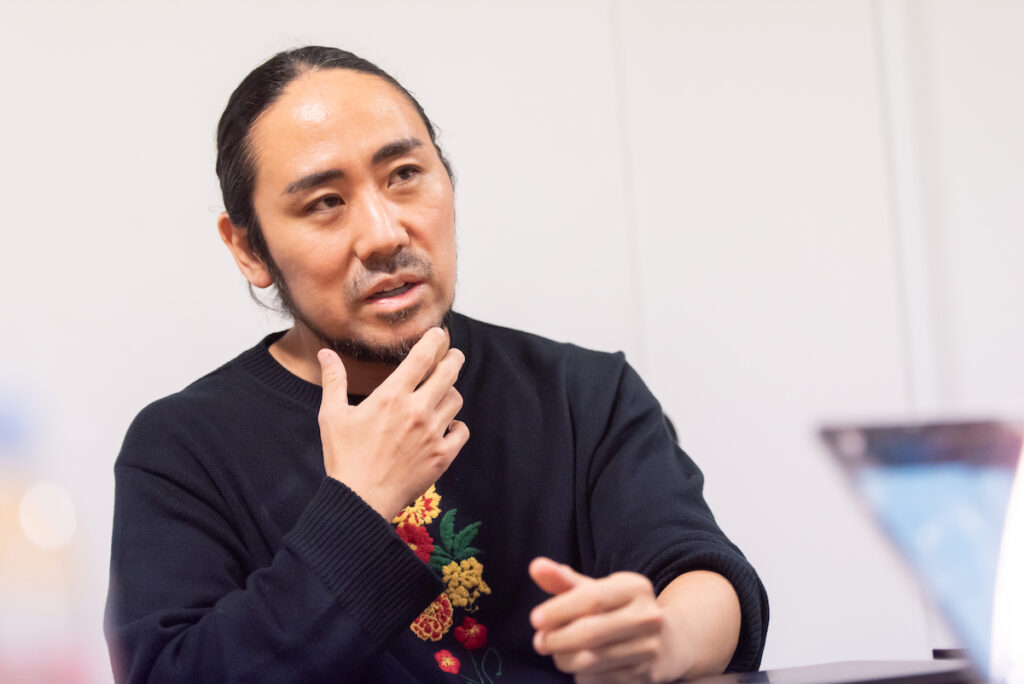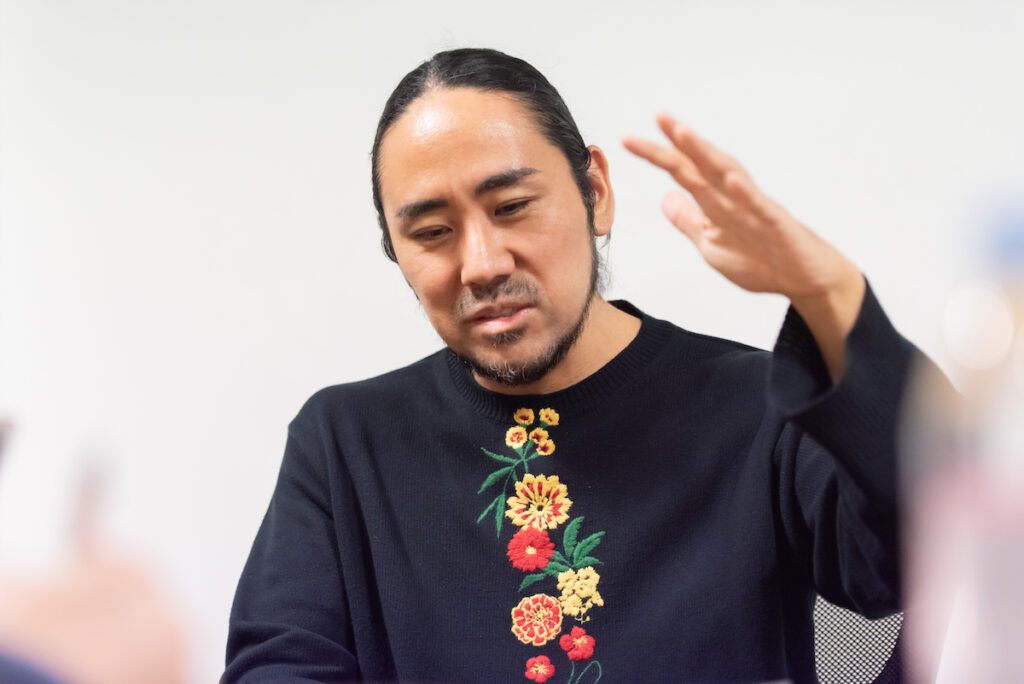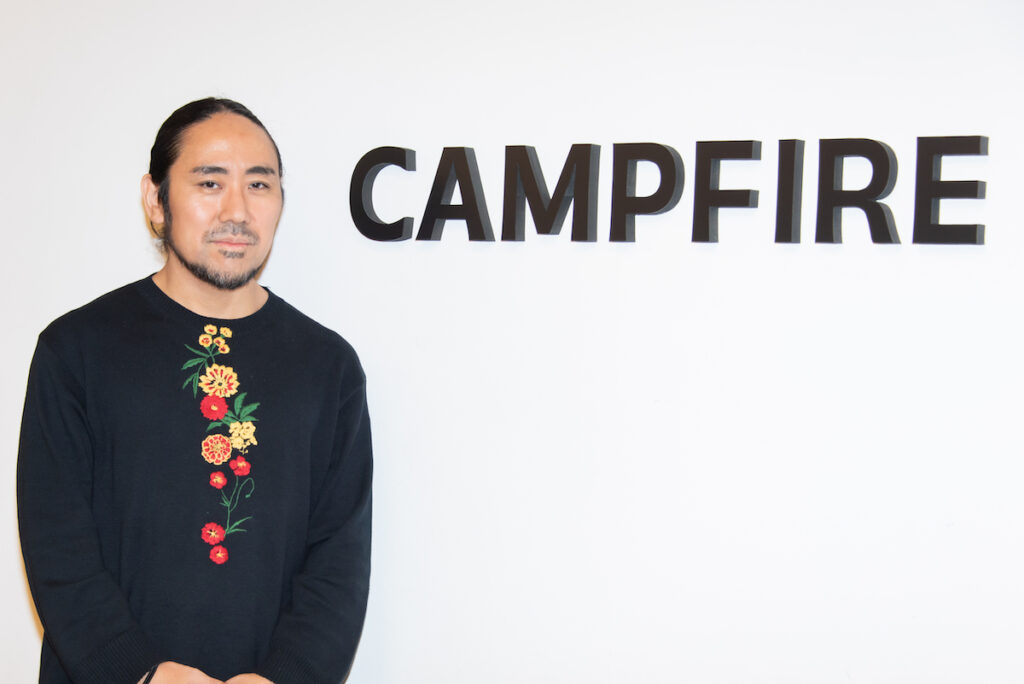
CAMPFIRE, headed by Mr. Ieiri, who is known as a serial entrepreneur, launched a new company “Livefor” in September 2023 that provides new crowdfunding and community services that utilize Web3 technology. Blockchain and Web3 are said to transcend national borders and build global connections, but what does Mr. Ieiri think of today’s society and economy? He speaks of “an economy of mutual support” and “a small economic zone.” What is the new economy using Web3?
A revolution is underway at the community level
—You emphasize the importance of “mutual support” and “community.”Where is its origin?
Ieiri:When I was in the second year of junior high school, I couldn’t go to school because of bullying. At that time, I was able to communicate with strangers beyond age, title, and gender through computer communication at the time, and although it was a casual chat, it was a great relief and made me realize that I am not alone. I did. That experience still remains within me as an original experience.
After that, we wanted to create a world where not only companies but also individuals could easily publish their homepages, diaries, poems, etc., so we started offering the inexpensive rental server “Lollipop!”. While continuing to support such individual expression, I realized that there was a need for a mechanism to raise funds when someone wanted to take the first step, and in 2011 I launched CAMPFIRE. It was right after the Great East Japan Earthquake.
My interest is in how to use the Internet to create a system where individuals who want to speak up but cannot, can take the first step. Rather, that’s the only thing I’m interested in.
──Is the shape and form of “community” changing?
Ieiri:As SNS and smartphones become more and more popular, I feel that the possibility of small individual economic zones centered on SNS is expanding. For me, “community” is a big keyword, and a revolution is occurring at the community level using various technologies.
For example, in the eastern part of Hokkaido, there are many young people working to ensure the continuity of the region even as depopulation progresses. Many people come from big cities, and they work together with local people to create communities and carry out activities. I myself am diving into such a community. Of course, there is also a work aspect to it, but I have always had a personal interest in religion and hippie communes, so I have been researching them. I feel that Hokkaido’s activities are close to that, in the sense of living together with a common ideology and sharing limited resources. Such communities are expanding throughout Japan, and I think that from here on, communities that utilize various technologies will continue to expand. We are thinking about what we can do in this situation.
As the birthrate declines and the population ages, for example, we will enter a world in which rural areas are forced to shrink economically, and some people will fall out of existing financial institutions. Even if people without credit or track records raise their voices, financial institutions will not lend money easily. How can we create something like a new type of finance by serving as a platform for such people and supporting each other? Rather than disrupting traditional finance, we believe that we can create a “new type of financial system” that only we can do.
A form of support that is not just money


──When did you start paying attention to blockchain and Web3?
Ieiri: In 2017, we opened a crypto asset (virtual currency) exchange as a “deemed operator.” However, there were many legal ambiguities at the time, and in the end we surrendered the license and abandoned the business, but we have continued to explore the possibilities ever since. For example, “Polca” is a small crowdfunding service that allows students to buy a 3000 yen book to study programming. It was a system where everyone could pool their money to buy birthday presents. Send money with gratitude. Money is a communication tool. At the time, we weren’t using Web3 technology, but we were thinking of sending returns in the form of tokens in the future.
Since it was launched after the Great East Japan Earthquake, there is an impression that “crowdfunding must be socially good.” I think it has many more uses. I’d be happy if someone could buy the book and write code, and I want to create a world where it’s easier to do that. There were many things I wanted to do, but due to legal obstacles, I had no choice but to give up on some of them. However, when it comes to how to essentially incorporate Web3 from now on, I don’t want to do something that doesn’t make sense. We’re focusing on things that are meaningful because we’re the ones doing it, and we’re finally starting to see the “community” as an axis, so we’re moving forward with development.
──How will the new company utilize blockchain?
Ieiri:The new company “Livefor” will support the “community” aspect as a product. Although the specific form is still to be determined, crowdfunding is based on support with funds, but originally there should be various forms of support for a project. There are people who provide funding, and there are people who are good at design. You could also support them by offering your skills and time.
When we look at crowdfunding in a broad sense, we want to create a world where people connect with each other, and where commitment to the extent of one’s ability is firmly evaluated. We would like to utilize blockchain in this area.
I lacked “preparation” for Web3


──Are there any tailwinds from the fact that regulations related to Web3 have become more established than before?
Ieiri: I think this kind of worldview has become pervasive in society as well. Previously, I myself thought that it was important for Web 2.0 people like us to create “Web 2.5” until the world of Web 3.0 arrived. We should go through the 2.5 phase and then move to 3.0, and once we found something that essentially had to be Web 3.0, we were thinking of stepping into it in earnest.
However, lately I’ve started to think that I was saying something rather tepid. The world of Web3 is definitely coming, and people like us will have to change our form once again and provide the value we can in a different way. I think we have to make our own bets against such a world. I don’t think we were prepared enough to face Web 3.0, choose the future we wanted, and make a bet.
On the other hand, when we think about Web 3.0, where autonomous decentralization is the key, we realized that we are actually already a large platform. I don’t mean to deny or look down on ourselves, but on the other hand, we need to be aware that we are like that. We have been working on a model where we support people who want to start a project, and we work between them and receive a commission. As the platform, we ourselves have become a centralized entity.
CAMPFIRE’s mission is “Create a world where thoughts and money can be exchanged for as many people as possible and as many as one yen.” If we really try to make that happen, in the end it would be better if there were no people like us. However, we also have the know-how that we have cultivated over the years, and we have been exploring how to utilize it in the world of Web3. I believe it is right to receive compensation for providing value, but rather than just matching and receiving a fee, we should provide some value to the community that continues. We charge a fee for what you do. I think we need to shift in that direction.
Web3 that incorporates the commons concept
──The Liberal Democratic Party’s web3 project team (web3PT) is working on developing legislation for DAOs (decentralized autonomous organizations), but is the new project supposed to be something like a DAO?
Ieiri:I think it will be exactly like DAO. Currently, there are people all over the country who are participating in “Regional Revitalization Cooperation Teams” and are active, and we have also released a crowdfunding campaign specifically for Regional Revitalization Cooperation Teams. However, there are some people who have a desire to be active but do not fit in with the local community. Some people end up struggling alone and are unable to take the plunge even if they are thinking of starting a business in their local area. If we can form communities and networks through sharing know-how and introducing people, more projects may be launched. We are proceeding with product development using this as a test case. As a result of each individual working in an autonomous decentralized manner, various projects are launched, and by contributing to these projects, tokens can be earned. Rather than creating a system that can be imagined, we have created something that can actually be used together with the people involved in the project. I want to go.
How to implement Web3 that incorporates the concept of commons (mechanisms and spaces for joint management of shared resources), such as how to create sustainable regions and how to use social common capital to sustain regions. I believe that what we do is important. In rural areas, there are situations in which problems can no longer be solved simply by relying on the government. As the population declines, financial resources are also decreasing, and medical care and education are becoming unsustainable. It is becoming more important to not only ask the government to do something, but also to think about how we can continue this on our own. How can we sustain the economy and region in the future? Can we create community and community? At that time, blockchain and DAO are extremely useful technologies and tools, and I believe that they exist for this purpose.
──What kind of year do you think 2024 will be?
Ieiri:There was a world where GAFA and other organizations rose beyond national borders, and the definition of a country became vague. Currently, the country is trying to regain its identity, redraw its borders, and regain centralized power. On the other hand, I feel that we are living in an era where a trend toward autonomous decentralization similar to DAOs is emerging at the same time.
People talk about things like “excessive capitalism,” but there are people who are having a difficult time living and are suffering. Many unsustainable things are happening, such as environmental problems and wars, but on the other hand, capitalism has strength and cannot be easily denied. If this is the case, the important question is how to create a new layer on top of the layer called capitalism. Individuals create small economic zones, overlap with each other, and create communities that support each other. I am depicting that kind of worldview.
I don’t know if it will be in 2024, but the Japanese economy may crash at some point. In addition, some people will be born who will have a hard time. I’m not looking forward to that, but I think new technologies will become commonplace and major changes will occur. Toward that end, I want to create a world where people don’t have to be alone. I believe that one answer is community.


Kazuma Ieiri
In 2003, he founded paperboy&co. (currently GMO Pepabo), and in 2008, he became the youngest company to list on JASDAQ. Founded CAMPFIRE in 2011. BASE was established in 2012 and listed on TSE Mothers in 2019. In 2021, he was ranked 3rd in Forbes JAPAN’s “Japanese Entrepreneur Ranking 2021”.
|Interview/Text: Takayuki Masuda
|Photo: Airi Okonogi
|Writing cooperation: Koki Mizuno
The post Web3 is for the community. Creating a new layer on top of capitalism – Kazuma Ieiri, CEO of CAMPFIRE[2024 Special Feature]| CoinDesk JAPAN appeared first on Our Bitcoin News.

 1 year ago
128
1 year ago
128














 English (US) ·
English (US) ·